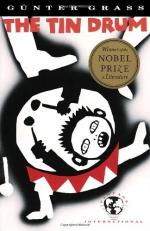|
|
The Tin Drum Chapter 43: On the Atlantic Wall or Concrete Eternal
Schmuh fired Oskar and the rest of "The Rhine River Three," for his drum solo that turned the patrons of the Onion Cellar into children without even using onions. Oskar thinks that Schmuh feared his competition. But the patrons complained; the band was brought back part time.
One day Schmuh took Oskar, Klepp, and Scholle with him sparrow hunting. Schmuh's wife drove. The three musicians stayed behind by the river while Schmuh hunted. He hunted quickly, shooting his maximum twelve sparrows before Klepp could finish a handful of raisins. As they were about to leave, a sparrow appeared, not far away. It was a perfect specimen, and Schmuh could not resist adding the thirteenth sparrow to his pile. Everyone piled in the car to leave except Oskar, who decided to walk home. As Oskar passed a gravel pit on his walk, he saw the car twenty feet below, upside down. Some workers had removed three injured people. Scholle, Klepp, and Schmuh's wife were almost unhurt - a few broken ribs - but Schmuh had been killed. Oskar visited Klepp in the hospital and asked him the story. Klepp said a swarm of thousands of sparrows had swarmed the car and forced it over the edge of the pit. Oskar says he is skeptical of the story. In the cemetery during Schmuh's funeral, Oskar saw Korneff, who doffed his cap according to regulation and did not recognize Oskar.
At the funeral Oskar was approached by a man named Dr. Dösch, who said he had been present when Oskar had reduced the Onion Cellar patrons to blubbering pant-wetting children. He offered Oskar a contract to take his drum act on the road; Oskar said he'd need time - he wanted to take a trip to straighten out his head. Oskar did, however, accept an advance from the doctor. Although not his first choice, Oskar took his trip with Lankes. At the door to Lankes' apartment, Ulla announced that she and Lankes were engaged again. Oskar was going to invite her along, but Lankes boxed her on the ear and put an end to that. Oskar didn't defend her, he says, because she was a Muse, and it was better to keep Muses at arm's length. Oskar and Lankes went to Normandy, where they had first met.
Lankes was a constant smoker but never bought cigarettes. Every time he bummed a cigarette, he took a ten-pfennig piece out of his left pocket and put it in his right. That way, he said, he would make almost two marks a day, just by smoking. He and Oskar took a train north, looking at all the bombed-out villages from WWII. They took up residence in Dora seven, the pillbox Lankes used in the war. Lankes traded some fisherman a codfish for a picture of their boat; Oskar cleaned and prepared the fish while Lankes painted. Once done, Oskar had to convince Lankes that he had gotten the better half of the fish; Lankes would not eat it unless he knew that he had beaten Oskar. They drank red wine; Lankes told the story of how drunk he and his buddies had been on wine when the Normandy invasion started. Herzog, Lankes' superior during the war, turned up unexpectedly. He wanted to inspect the pillbox, but Lankes refused him, saying it was passé. Herzog held that nothing was passé, that one cannot escape the judgment of history. Lankes hit him and tossed him off the edge of the sand dune.
Oskar and Lankes reminisced about the nuns they had seen on the day before the invasion. A few minutes later, a young nun strolled by. A voice from far off called to her - her name was Sister Agneta, the same young nun as they had seen before. Lankes talked to her before she was whisked away. As they got smaller, Lankes said they weren't nuns anyway, they were black sailboats. Lankes said Agneta's steering mechanism had gone awry; she came back to the pillbox and Lankes showed her around underground. The other nuns came by, looking for Agneta; Oskar pointed them down the beach. Lankes came out again and began to eat his fish; the sister, he said, was inside mending a rip in her habit. Agneta came out, tried the fish, then ran off toward the water. Lankes imagined the artistic possibilities of nuns and water. When he got home he painted these possibilities, and it was Lankes' success that made Oskar take the deal with Dr. Dösch.




